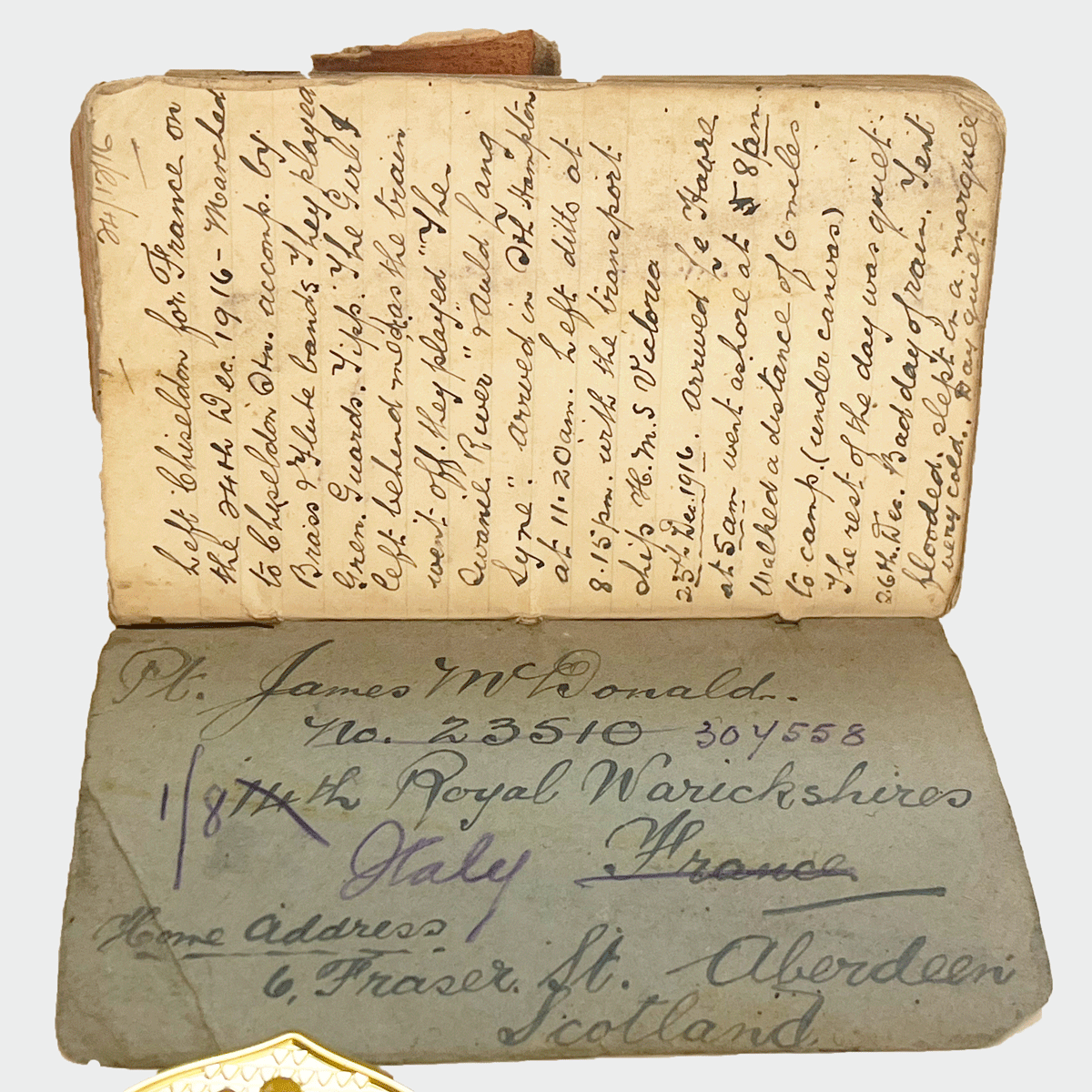 Image 1 of 9
Image 1 of 9

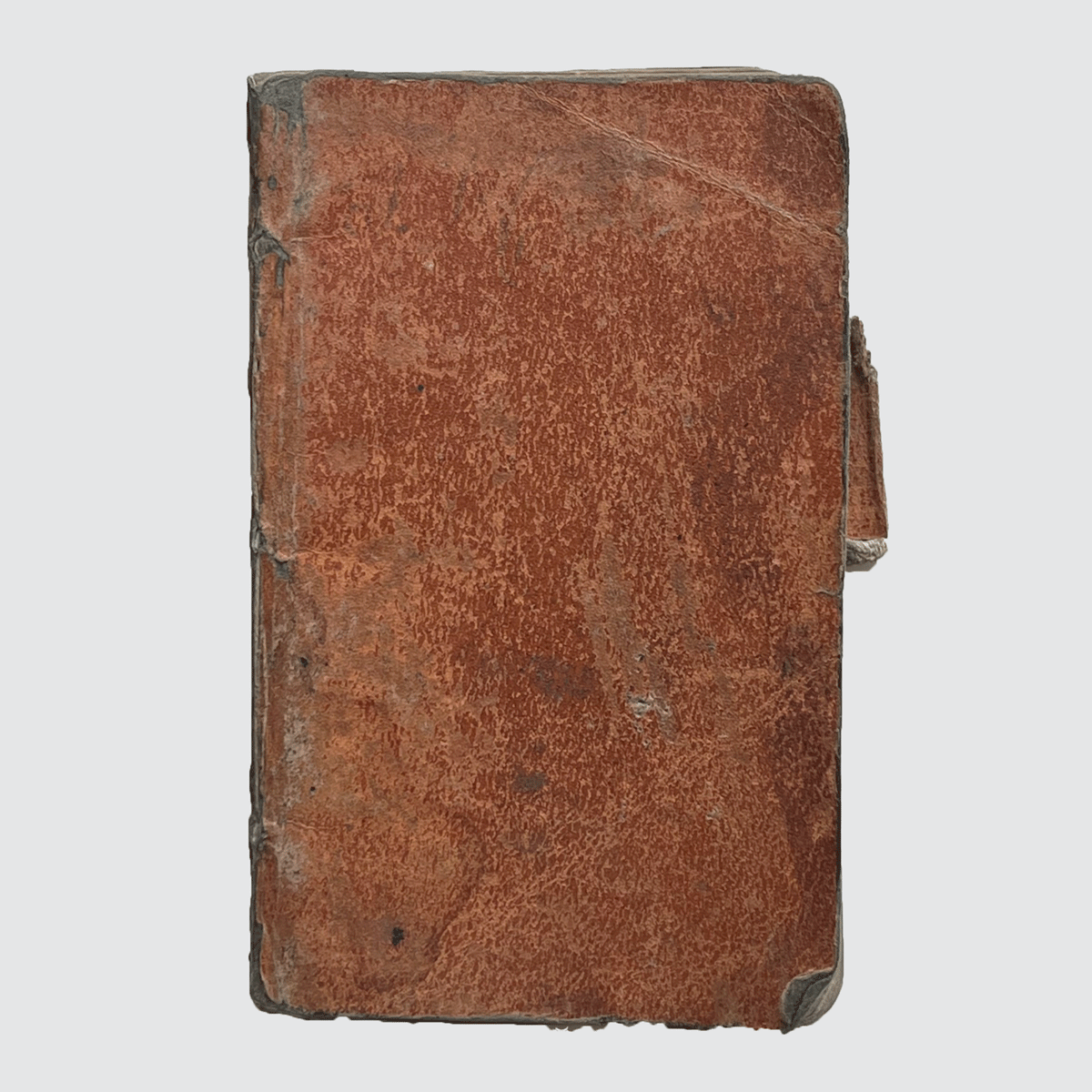 Image 2 of 9
Image 2 of 9

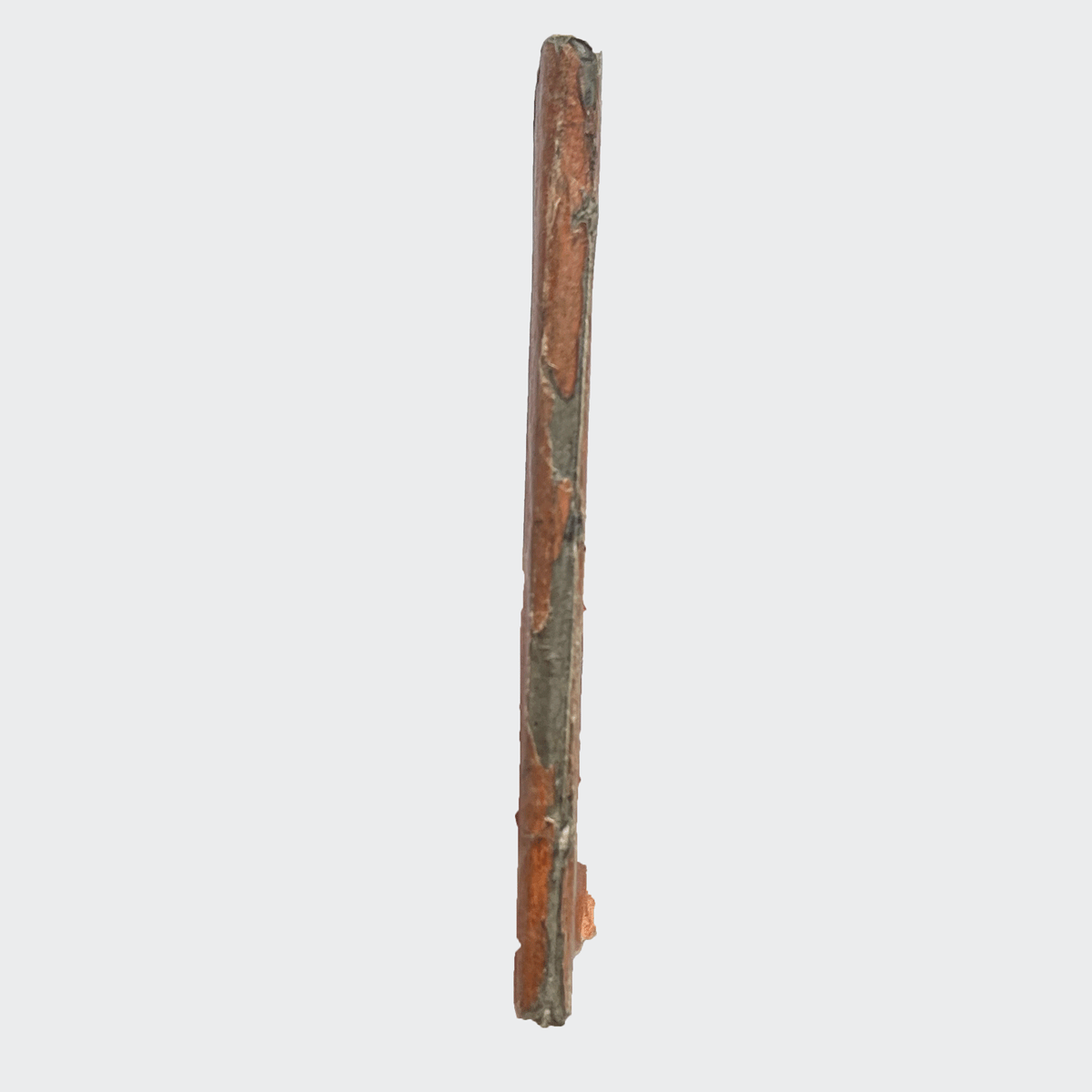 Image 3 of 9
Image 3 of 9

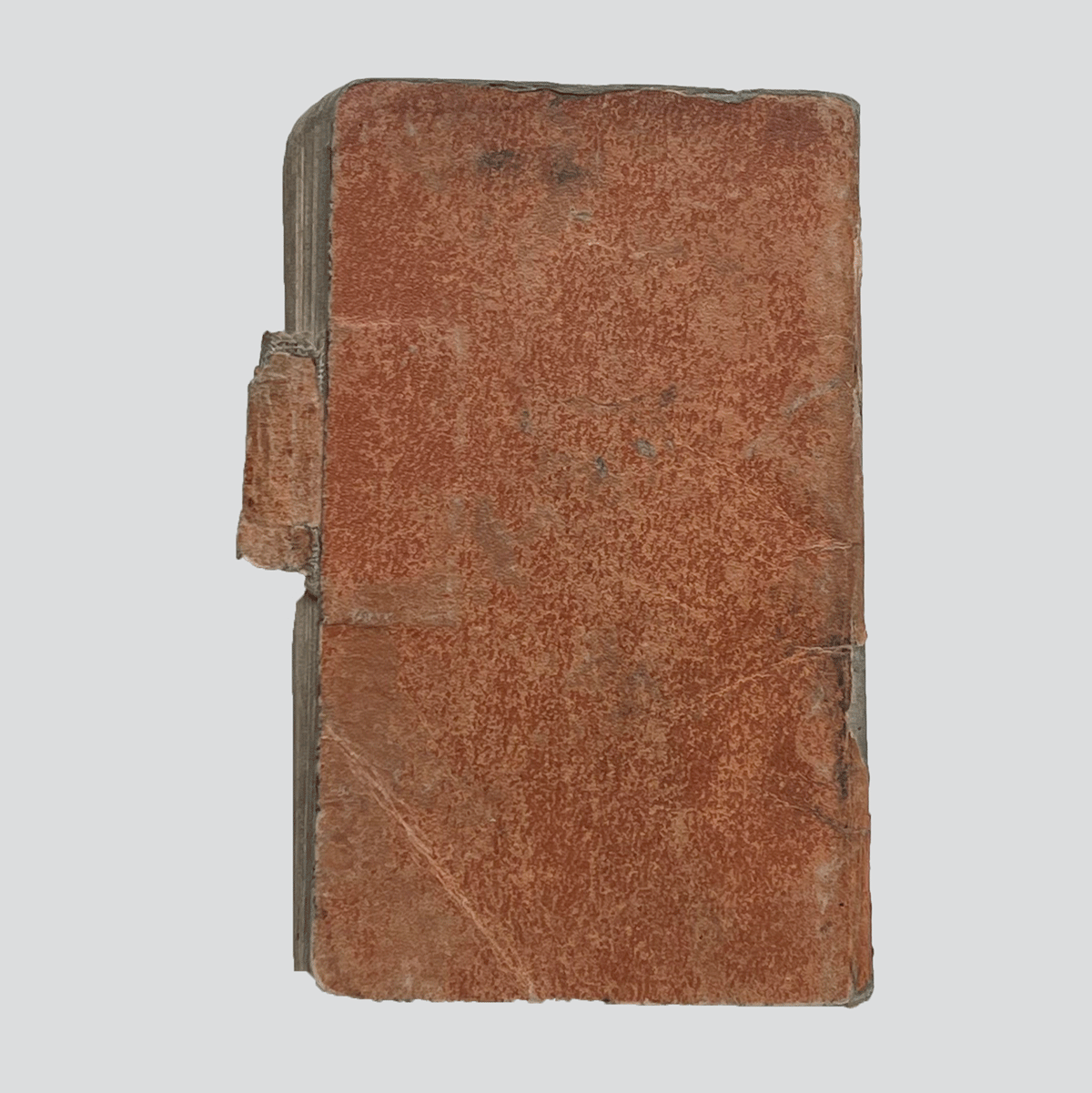 Image 4 of 9
Image 4 of 9

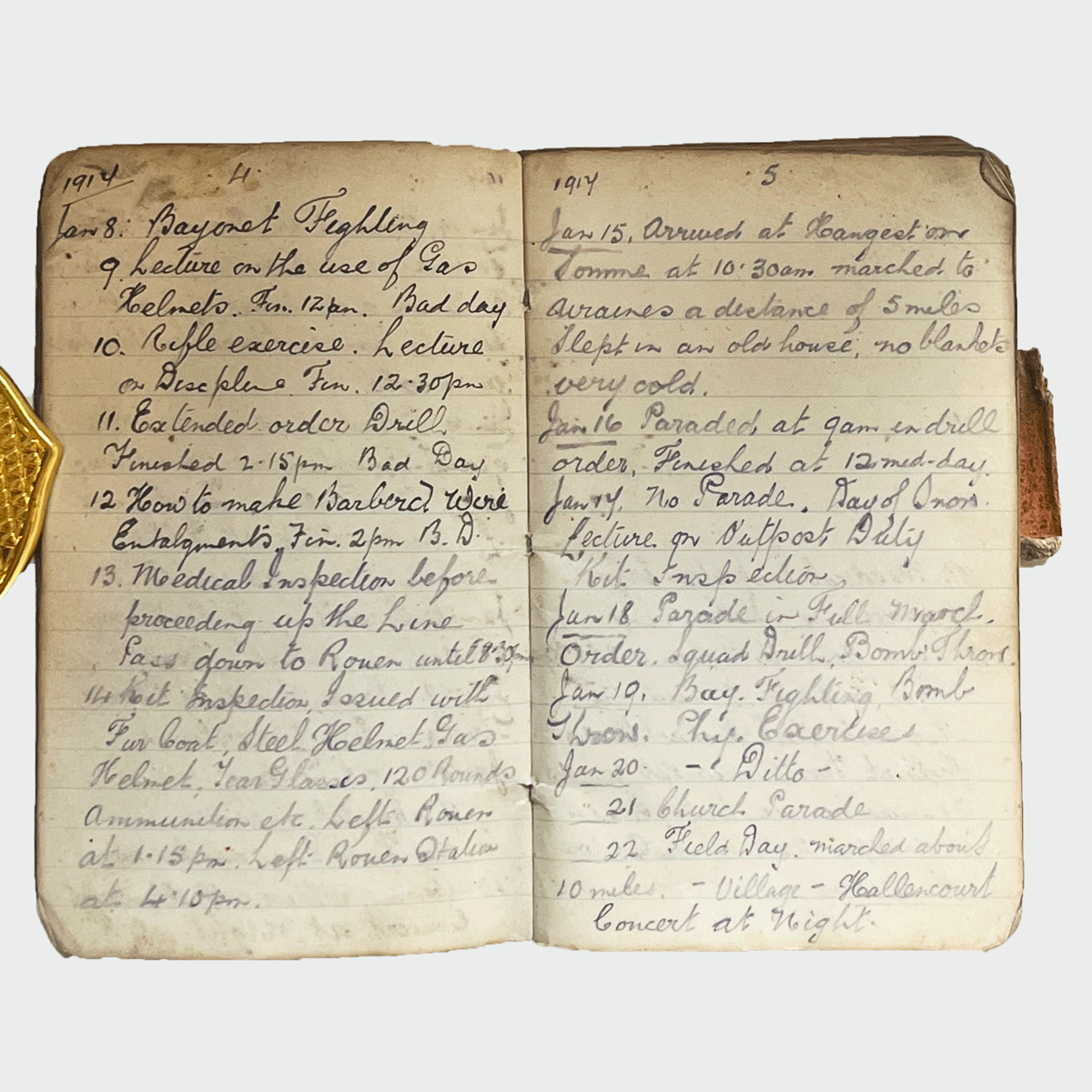 Image 5 of 9
Image 5 of 9

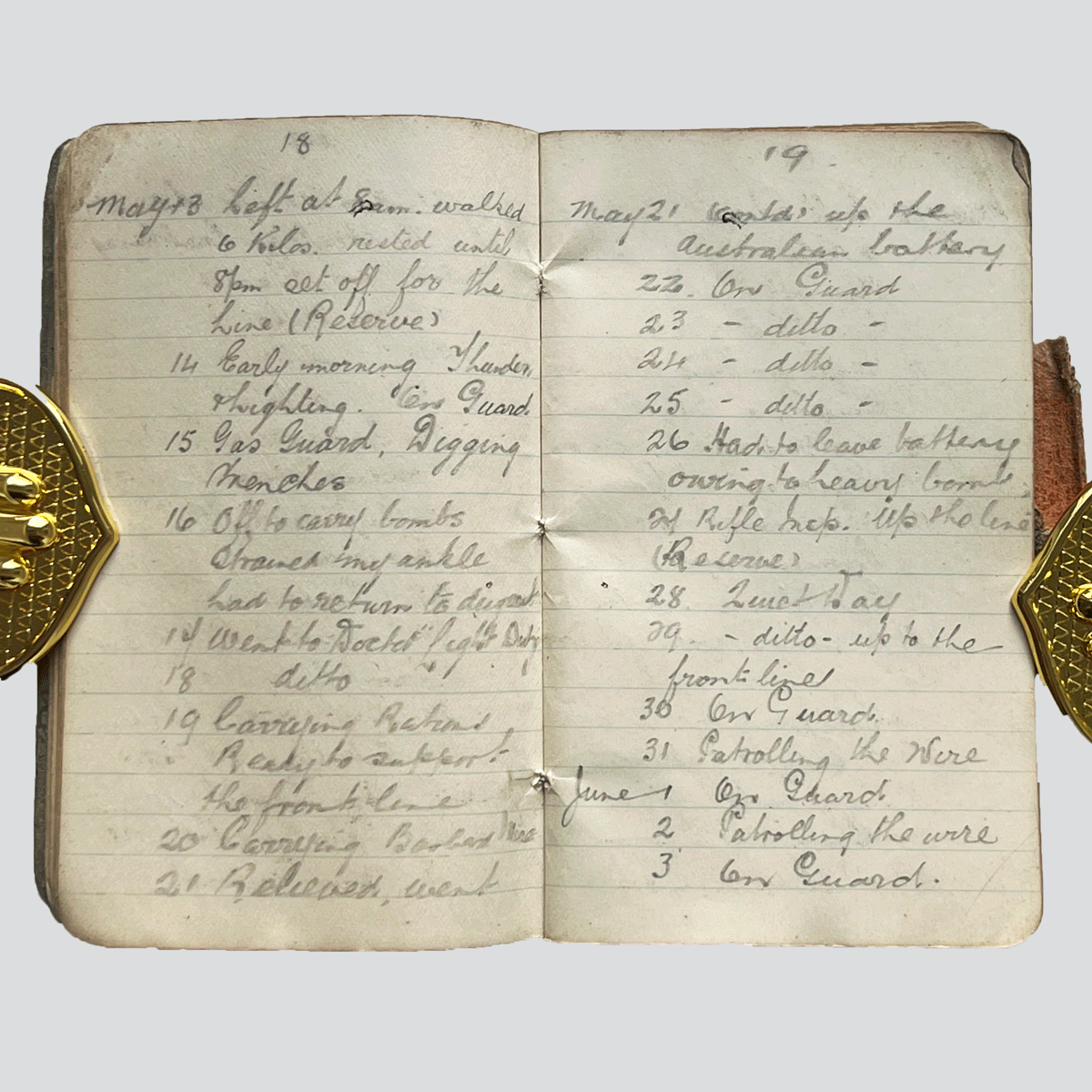 Image 6 of 9
Image 6 of 9

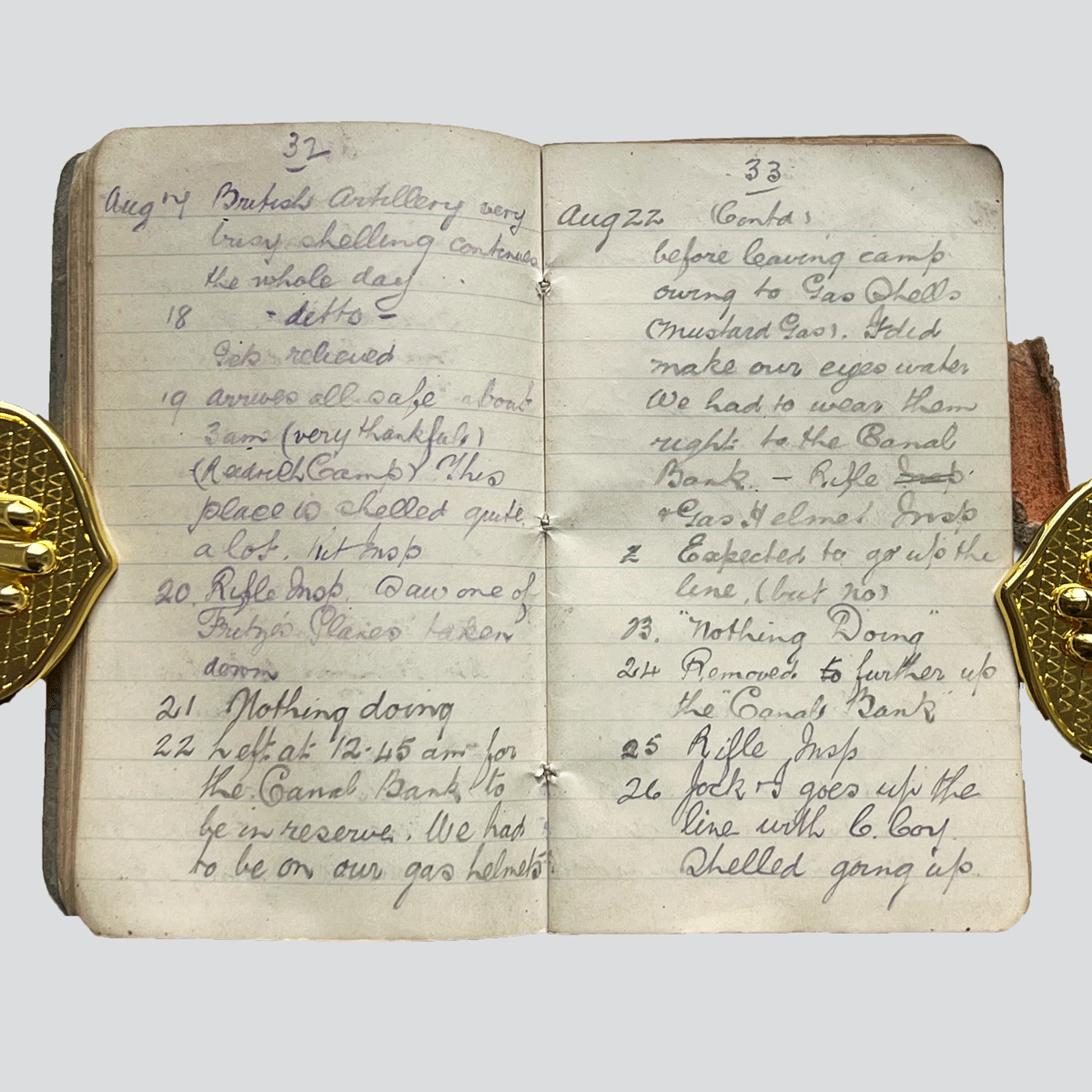 Image 7 of 9
Image 7 of 9

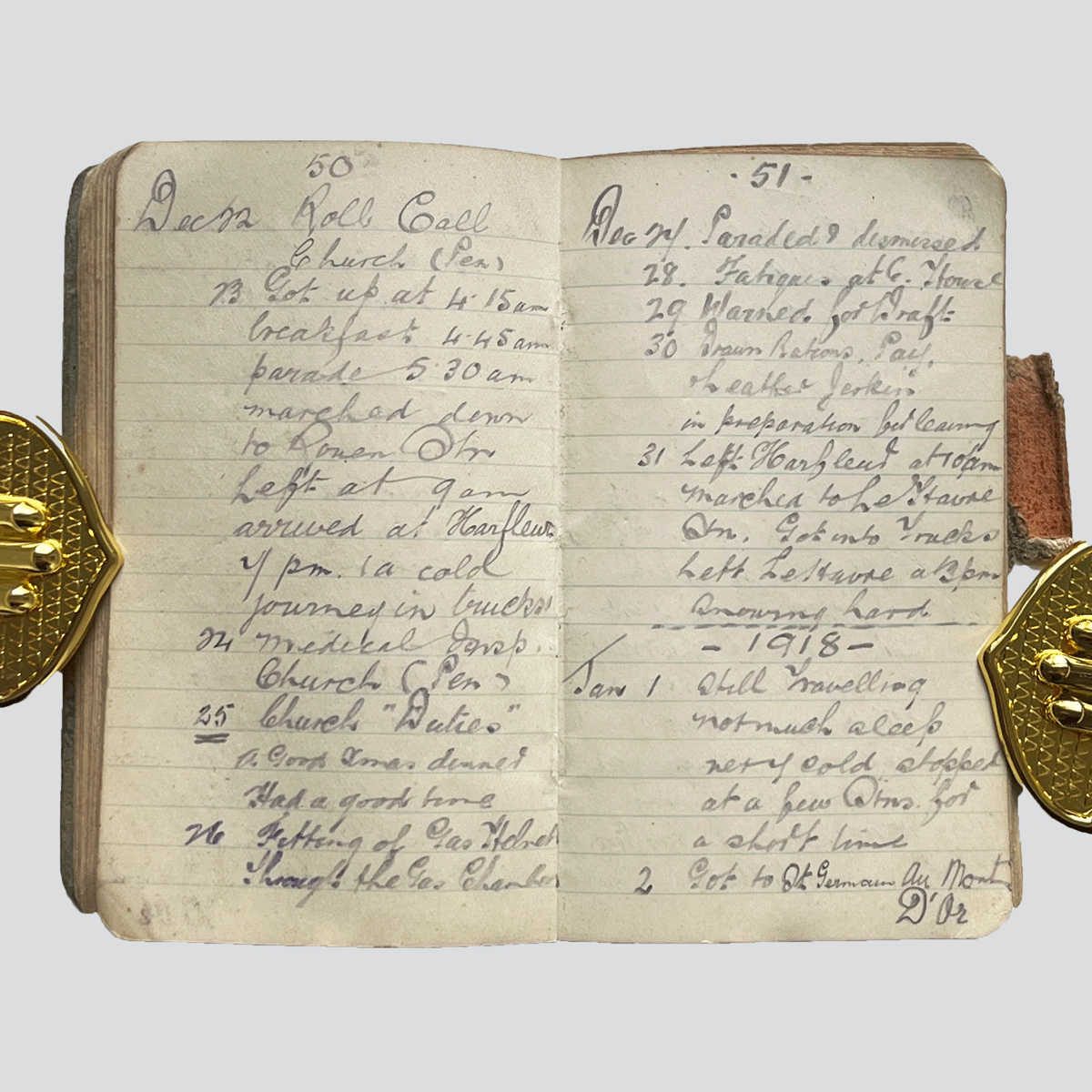 Image 8 of 9
Image 8 of 9

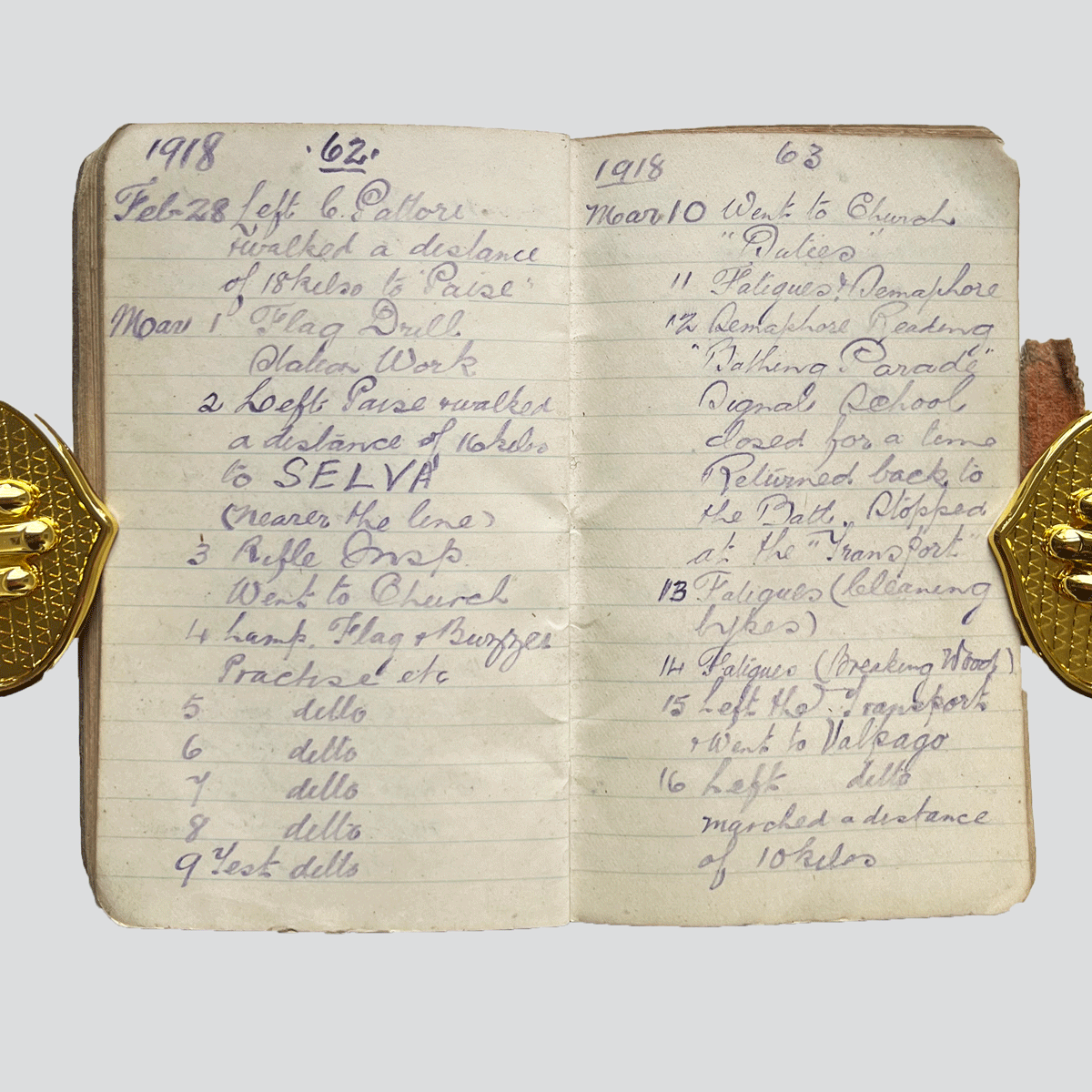 Image 9 of 9
Image 9 of 9










A unique World War One Journal compiled by Private James McDonald of the Royal Warwickshire Regiment.
A unique journal compiled by Private James McDonald of the Royal Warwickshire Regiment between December 1916 to July 1918, providing a detailed account of his military service during the First World War. The journal provides a wealth of information about Private McDonald’s wartime experiences; his training, movements, experiences in the trenches, and encounters on the Western and Italian fronts. A special survival from the First World War providing a fascinating first-hand account of a soldier’s experiences of war and an important historical record of the brave and vital military service provided by members of the Royal Warwickshire Regiment.
Original card backed boards, 7.5cm*12.2cm, 76 pages of manuscript text, ownership inscription together with regiment details and home address of Private McDonald to the front pastedown. The journal has been well looked after and carefully preserved. Some wear to the binding, the occasional minor blemish to the contents; very good.
A full typed transcript of the contents of the journal is available.
The journal commences on the 24th December 1916:
“Left Chisledon for France on the 24th Dec 1916 – Marched to Chisledon Stn accomp(anied) by Brass & Flute bands. They played Gren(adier) Guards, Tipp(errary), The Girl I Left Behind Me and as the train went off they played “The Swanee River” & Auld Lang Syne. Arrived in S(ou)th Hampton at 11.20am. Left ditto at 8.15pm with the transport ship H.M.S.Victoria.”
After arriving in France, Private McDonald undertook numerous training sessions and exercise movements. For example, on the 29th December 1916, Private McDonald records:
“Parade in full marching order. Lect(ure) on the use of gas helmets. Had to go through the gas chambers with gas helmets on. The effects of tear shells. Fin(ished) for the day at 2.30pm. Fine day.”
Trench warfare commenced for Private McDonald in February 1917. On February 1st 1917 he writes:
“Issued with 3 bombs, 50 rounds amm(unition). Ready to proceed up the line taking over the French position. Left at 4pm arrived at 8pm Peronne District. Support trenches. Western Front Gas Guard.”
Insight into the horrors of trench warfare is provided in the journal. For example on February 4th 1917, he writes:
“Painful duty of burying the dead. Very bad night of shells, snipers, a hot time. Out from 1am coming back we lost our way, had to wait in a dugout until morning, unsafe to go out.”
On March 27th 1917, he writes:
“Shifted further up to trenches. Got shelled a bit. Slept in the trenches. Very cold.”
Private McDonald records some of the injuries and deaths to the men he is serving with. For example, on April 28th 1917:
“Jock admitted to hospital.”
On March 25th 1917 he wrote:
“David Taylor killed.”
An insight into the importance of receiving communications from loved ones at home to keep up morale is indicated on July 15th 1917:
“Breakfast at 9am. Walked to Belle in the afternoon to see if there was any letters.”
Throughout the journal, Private McDonald records his military duties, and experiences fighting the enemy. On March 18th 1917, Private McDonald writes:
“Arrived at Halle at 2am. Patrol duty the whole night. No sleep very tired. The Germans evacuate. Marched on to Maimont then to Peronne (City). The last Germans must have left this city some time ago. No sign of any Boches. Was one shot coming through the city. What a city of destruction, burning b(ui)ld(ing)s a sad sight. (On sentry). Bridges blown up. Was brought across the canal on ponte (RE). The wells poisoned with arsenic (lovely day).”
April 15th 1917:
“Left Peronne for up the line. Stopped at Salicourt & Epely moved up to the trenches. There for 24 hrs. Back to Epely. Up to the front line (advanced past) there for 24 hrs very heavy bombard(ment).
Germans using a search-light, a bit exciting, glad to get relieved. Marched to Longavenes (dead tired).
Rifle Insp(ection) Lewis Gun instruction.
Standing to at 3.30am”
May 15th 1917:
“Gas Guard. Digging trenches.”
May 16th 1917:
“Off to carry bombs strained my ankle had to return to dugouts.”
May 20th 1917:
“Carrying barbed wire.”
May 31st 1917:
“Patrolling the wire.”
June 16th 1917:
“Set out on an attack on a German outpost. Got fired at. Found the post unoccupied. (Jock leaves for musk(etry) course).”
June 17th 1917:
“Returned all safe from the above. Had to report to O/C Sig(nal) Section. Sent to station in the front line.”
August 5th 1917:
“aircraft busy on both sides. German aircraft dropping bombs not far from our camp.”
August 14th 1917:
“Enemy shelling quite near our camp. C.A. Hut damaged. A bit exciting while it lasted. It started between 1am – 2am. Lamp Flag & Shutter reading. Phys(ical) Drill.”
August 16th 1917:
“Left between 4am – 5am marched to Canal Bank had breakfast there. What a quantity of batteries we saw on our road up. Left Canal Bank at 7.15am. Excitement commences. Passed through a heavy barrage of fire shells dropping quite close to us. Had to change our route shell drops right by our side. Got a shower bath it landing in a hole full of water. Met a lot of British & German soldiers coming down the line. Got into a trench where we were sniped at a great deal, two chaps gets wounded in this trench. I moved to Batt(alion). Hqs. Shelling still very fierce. Moved further into the line. Stops in a shell (hole) for 24 hrs. At Coy Hqrs they thought I was missing. Goes to Coy Hqrs where I stay there. Concrete dugout full of water, got a bit of a nights rest.”
August 17th 1917:
“British Artillery very busy shelling continuous the whole day.”
August 19th 1917:
“Arrives all safe about 3am (very thankful) (Reedrich Camp). This place is shelled quite a lot. Kit Insp.”
August 22nd 1917:
“Left at 12.45am for the Canal Bank to be in reserve. We had to (put) on our gas helmets before leaving camp owing to gas shells (Mustard Gas). It did make our eyes water. We had to wear them right to the Canal Bank – Rifle & Gas Helmet Insp(ection). Expected to go up the line (but no).”
August 26th 1917:
“Jock & I goes up the line with C Co(mpan)y. Shelled going up the road. Snipers active. Gets into a big bloke (block) house (cement) plenty of shells coming across. Watching lamp & shutter signals.”
August 27th 1917:
“Watching lamp & shutter signals. Attack comes off at 2pm. What a bombardment. Had to cross to our Batt(alion). Hqrs. Glad to arrive there. Stopped at Batt(alion). Hqrs until 6pm & advanced to German gun pits. Oh! What a barrage to pass through with the rain falling into shell holes it was terrible. The sniping was wicked. Gets relieved & very glad too.”
August 28th 1917:
“Gets back from the line about 2am. Wet & covered with mud. Slept under bivouacs. We entrained to Poperinghe & went to a barn for a billet.”
Between 1st November 1917 and 15th December 1917, Private McDonald details his admission to hospital and recovery before returning to military duty.
Private McDonald records his experiences on Christmas Day in 1917:
“Church “Duties”. A good Christmas dinner. Had a good time.”
Christmas celebrations were brief. On boxing day 1917 he was back to military duty:
“Fitting of gas helmets. Through the Gas Chamber.”
The warfare Private McDonald participated in during 1917 was all in France. In January 1918, he arrived to fight on the Italian front. On January 6th 1918 he writes:
“Arrived at San Remo. Stopped there for a short time also at Porto Mauruzio (Riviera), Savona, Campier Darena. Italian ladies & gentlemen gave us cigs, matches & (????) there, arrived at Aquatic. All along the way the Italians gave us a grand reception. We marched to camp at Aquatic snowing heavily (in tents) miserable weather. The scenery was gorgeous.”
January 9th 1918:
“The coldest day I have ever experienced. A touch of frost bitten feet.”
January 11th 1918:
“Feeling bad. Pains all over. A touch of the PHO again.”
January 14th 1918:
“Left Rest Camp at 10am had a good night rest there in a Morgue. Marched 15 kilos. We got our blankets carried also our kits (part of the way). Met Jock out practising signalling very pleased to see him. Reported at Hqrs (Nove). I had tea with Jock then had a walk round the village. Slept with the Platoon for a night.”
January 19th 1918:
“Up to see our positions at Crosara. Very steep hill climbing got a lovely view of the surrounding country. From Nove to Crosara a distance of 18 miles. It was a nice days outing. Passed through Marostica.”
January 1st 1918:
“Anniversary of our first time in trenches. Battalion day.”
April 27th 1918:
“Out on a forward position from 5am to 8pm. One of our Compan)y’s made a stunt, 1 prisoner taken. What a night of rain. Slept through the bombard(ment). Never heard it.”
April 29th 1918:
“Out on the lines. “Stunt on one of the Austrian positions. Watching Lamp from forward position under a fairly heavy bombardment. Bad night of rain.”
April 30th 1918:
“Relieved from the line.”
May 13th 1918:
“Bathing Parade. Went sick. Feeling very bad. Admitted to hospital.”
May 20th 1918:
“Left hospital. Taken by motor to the St(atio)n. Passed through Thiene arrived at a place called Vallavoria. Took the train from there arrived at a small village. Slept there for the night.”
July 3rd 1918:
“Left Sig(nal) School to rejoin Batt(alion). Got ride on motor from Calvana to Thiene then to Castelgomberto. I thought the batt(alion) was at Castlegombero but found that they were at Montecchio Maggiore.”
The final entry in the journal is on July 12th 1918:
“Signalling. Firing at Range. Names taken for leave.”
Please contact us for shipping costs if ordering from outside the UK.
A unique journal compiled by Private James McDonald of the Royal Warwickshire Regiment between December 1916 to July 1918, providing a detailed account of his military service during the First World War. The journal provides a wealth of information about Private McDonald’s wartime experiences; his training, movements, experiences in the trenches, and encounters on the Western and Italian fronts. A special survival from the First World War providing a fascinating first-hand account of a soldier’s experiences of war and an important historical record of the brave and vital military service provided by members of the Royal Warwickshire Regiment.
Original card backed boards, 7.5cm*12.2cm, 76 pages of manuscript text, ownership inscription together with regiment details and home address of Private McDonald to the front pastedown. The journal has been well looked after and carefully preserved. Some wear to the binding, the occasional minor blemish to the contents; very good.
A full typed transcript of the contents of the journal is available.
The journal commences on the 24th December 1916:
“Left Chisledon for France on the 24th Dec 1916 – Marched to Chisledon Stn accomp(anied) by Brass & Flute bands. They played Gren(adier) Guards, Tipp(errary), The Girl I Left Behind Me and as the train went off they played “The Swanee River” & Auld Lang Syne. Arrived in S(ou)th Hampton at 11.20am. Left ditto at 8.15pm with the transport ship H.M.S.Victoria.”
After arriving in France, Private McDonald undertook numerous training sessions and exercise movements. For example, on the 29th December 1916, Private McDonald records:
“Parade in full marching order. Lect(ure) on the use of gas helmets. Had to go through the gas chambers with gas helmets on. The effects of tear shells. Fin(ished) for the day at 2.30pm. Fine day.”
Trench warfare commenced for Private McDonald in February 1917. On February 1st 1917 he writes:
“Issued with 3 bombs, 50 rounds amm(unition). Ready to proceed up the line taking over the French position. Left at 4pm arrived at 8pm Peronne District. Support trenches. Western Front Gas Guard.”
Insight into the horrors of trench warfare is provided in the journal. For example on February 4th 1917, he writes:
“Painful duty of burying the dead. Very bad night of shells, snipers, a hot time. Out from 1am coming back we lost our way, had to wait in a dugout until morning, unsafe to go out.”
On March 27th 1917, he writes:
“Shifted further up to trenches. Got shelled a bit. Slept in the trenches. Very cold.”
Private McDonald records some of the injuries and deaths to the men he is serving with. For example, on April 28th 1917:
“Jock admitted to hospital.”
On March 25th 1917 he wrote:
“David Taylor killed.”
An insight into the importance of receiving communications from loved ones at home to keep up morale is indicated on July 15th 1917:
“Breakfast at 9am. Walked to Belle in the afternoon to see if there was any letters.”
Throughout the journal, Private McDonald records his military duties, and experiences fighting the enemy. On March 18th 1917, Private McDonald writes:
“Arrived at Halle at 2am. Patrol duty the whole night. No sleep very tired. The Germans evacuate. Marched on to Maimont then to Peronne (City). The last Germans must have left this city some time ago. No sign of any Boches. Was one shot coming through the city. What a city of destruction, burning b(ui)ld(ing)s a sad sight. (On sentry). Bridges blown up. Was brought across the canal on ponte (RE). The wells poisoned with arsenic (lovely day).”
April 15th 1917:
“Left Peronne for up the line. Stopped at Salicourt & Epely moved up to the trenches. There for 24 hrs. Back to Epely. Up to the front line (advanced past) there for 24 hrs very heavy bombard(ment).
Germans using a search-light, a bit exciting, glad to get relieved. Marched to Longavenes (dead tired).
Rifle Insp(ection) Lewis Gun instruction.
Standing to at 3.30am”
May 15th 1917:
“Gas Guard. Digging trenches.”
May 16th 1917:
“Off to carry bombs strained my ankle had to return to dugouts.”
May 20th 1917:
“Carrying barbed wire.”
May 31st 1917:
“Patrolling the wire.”
June 16th 1917:
“Set out on an attack on a German outpost. Got fired at. Found the post unoccupied. (Jock leaves for musk(etry) course).”
June 17th 1917:
“Returned all safe from the above. Had to report to O/C Sig(nal) Section. Sent to station in the front line.”
August 5th 1917:
“aircraft busy on both sides. German aircraft dropping bombs not far from our camp.”
August 14th 1917:
“Enemy shelling quite near our camp. C.A. Hut damaged. A bit exciting while it lasted. It started between 1am – 2am. Lamp Flag & Shutter reading. Phys(ical) Drill.”
August 16th 1917:
“Left between 4am – 5am marched to Canal Bank had breakfast there. What a quantity of batteries we saw on our road up. Left Canal Bank at 7.15am. Excitement commences. Passed through a heavy barrage of fire shells dropping quite close to us. Had to change our route shell drops right by our side. Got a shower bath it landing in a hole full of water. Met a lot of British & German soldiers coming down the line. Got into a trench where we were sniped at a great deal, two chaps gets wounded in this trench. I moved to Batt(alion). Hqs. Shelling still very fierce. Moved further into the line. Stops in a shell (hole) for 24 hrs. At Coy Hqrs they thought I was missing. Goes to Coy Hqrs where I stay there. Concrete dugout full of water, got a bit of a nights rest.”
August 17th 1917:
“British Artillery very busy shelling continuous the whole day.”
August 19th 1917:
“Arrives all safe about 3am (very thankful) (Reedrich Camp). This place is shelled quite a lot. Kit Insp.”
August 22nd 1917:
“Left at 12.45am for the Canal Bank to be in reserve. We had to (put) on our gas helmets before leaving camp owing to gas shells (Mustard Gas). It did make our eyes water. We had to wear them right to the Canal Bank – Rifle & Gas Helmet Insp(ection). Expected to go up the line (but no).”
August 26th 1917:
“Jock & I goes up the line with C Co(mpan)y. Shelled going up the road. Snipers active. Gets into a big bloke (block) house (cement) plenty of shells coming across. Watching lamp & shutter signals.”
August 27th 1917:
“Watching lamp & shutter signals. Attack comes off at 2pm. What a bombardment. Had to cross to our Batt(alion). Hqrs. Glad to arrive there. Stopped at Batt(alion). Hqrs until 6pm & advanced to German gun pits. Oh! What a barrage to pass through with the rain falling into shell holes it was terrible. The sniping was wicked. Gets relieved & very glad too.”
August 28th 1917:
“Gets back from the line about 2am. Wet & covered with mud. Slept under bivouacs. We entrained to Poperinghe & went to a barn for a billet.”
Between 1st November 1917 and 15th December 1917, Private McDonald details his admission to hospital and recovery before returning to military duty.
Private McDonald records his experiences on Christmas Day in 1917:
“Church “Duties”. A good Christmas dinner. Had a good time.”
Christmas celebrations were brief. On boxing day 1917 he was back to military duty:
“Fitting of gas helmets. Through the Gas Chamber.”
The warfare Private McDonald participated in during 1917 was all in France. In January 1918, he arrived to fight on the Italian front. On January 6th 1918 he writes:
“Arrived at San Remo. Stopped there for a short time also at Porto Mauruzio (Riviera), Savona, Campier Darena. Italian ladies & gentlemen gave us cigs, matches & (????) there, arrived at Aquatic. All along the way the Italians gave us a grand reception. We marched to camp at Aquatic snowing heavily (in tents) miserable weather. The scenery was gorgeous.”
January 9th 1918:
“The coldest day I have ever experienced. A touch of frost bitten feet.”
January 11th 1918:
“Feeling bad. Pains all over. A touch of the PHO again.”
January 14th 1918:
“Left Rest Camp at 10am had a good night rest there in a Morgue. Marched 15 kilos. We got our blankets carried also our kits (part of the way). Met Jock out practising signalling very pleased to see him. Reported at Hqrs (Nove). I had tea with Jock then had a walk round the village. Slept with the Platoon for a night.”
January 19th 1918:
“Up to see our positions at Crosara. Very steep hill climbing got a lovely view of the surrounding country. From Nove to Crosara a distance of 18 miles. It was a nice days outing. Passed through Marostica.”
January 1st 1918:
“Anniversary of our first time in trenches. Battalion day.”
April 27th 1918:
“Out on a forward position from 5am to 8pm. One of our Compan)y’s made a stunt, 1 prisoner taken. What a night of rain. Slept through the bombard(ment). Never heard it.”
April 29th 1918:
“Out on the lines. “Stunt on one of the Austrian positions. Watching Lamp from forward position under a fairly heavy bombardment. Bad night of rain.”
April 30th 1918:
“Relieved from the line.”
May 13th 1918:
“Bathing Parade. Went sick. Feeling very bad. Admitted to hospital.”
May 20th 1918:
“Left hospital. Taken by motor to the St(atio)n. Passed through Thiene arrived at a place called Vallavoria. Took the train from there arrived at a small village. Slept there for the night.”
July 3rd 1918:
“Left Sig(nal) School to rejoin Batt(alion). Got ride on motor from Calvana to Thiene then to Castelgomberto. I thought the batt(alion) was at Castlegombero but found that they were at Montecchio Maggiore.”
The final entry in the journal is on July 12th 1918:
“Signalling. Firing at Range. Names taken for leave.”
Please contact us for shipping costs if ordering from outside the UK.
A unique journal compiled by Private James McDonald of the Royal Warwickshire Regiment between December 1916 to July 1918, providing a detailed account of his military service during the First World War. The journal provides a wealth of information about Private McDonald’s wartime experiences; his training, movements, experiences in the trenches, and encounters on the Western and Italian fronts. A special survival from the First World War providing a fascinating first-hand account of a soldier’s experiences of war and an important historical record of the brave and vital military service provided by members of the Royal Warwickshire Regiment.
Original card backed boards, 7.5cm*12.2cm, 76 pages of manuscript text, ownership inscription together with regiment details and home address of Private McDonald to the front pastedown. The journal has been well looked after and carefully preserved. Some wear to the binding, the occasional minor blemish to the contents; very good.
A full typed transcript of the contents of the journal is available.
The journal commences on the 24th December 1916:
“Left Chisledon for France on the 24th Dec 1916 – Marched to Chisledon Stn accomp(anied) by Brass & Flute bands. They played Gren(adier) Guards, Tipp(errary), The Girl I Left Behind Me and as the train went off they played “The Swanee River” & Auld Lang Syne. Arrived in S(ou)th Hampton at 11.20am. Left ditto at 8.15pm with the transport ship H.M.S.Victoria.”
After arriving in France, Private McDonald undertook numerous training sessions and exercise movements. For example, on the 29th December 1916, Private McDonald records:
“Parade in full marching order. Lect(ure) on the use of gas helmets. Had to go through the gas chambers with gas helmets on. The effects of tear shells. Fin(ished) for the day at 2.30pm. Fine day.”
Trench warfare commenced for Private McDonald in February 1917. On February 1st 1917 he writes:
“Issued with 3 bombs, 50 rounds amm(unition). Ready to proceed up the line taking over the French position. Left at 4pm arrived at 8pm Peronne District. Support trenches. Western Front Gas Guard.”
Insight into the horrors of trench warfare is provided in the journal. For example on February 4th 1917, he writes:
“Painful duty of burying the dead. Very bad night of shells, snipers, a hot time. Out from 1am coming back we lost our way, had to wait in a dugout until morning, unsafe to go out.”
On March 27th 1917, he writes:
“Shifted further up to trenches. Got shelled a bit. Slept in the trenches. Very cold.”
Private McDonald records some of the injuries and deaths to the men he is serving with. For example, on April 28th 1917:
“Jock admitted to hospital.”
On March 25th 1917 he wrote:
“David Taylor killed.”
An insight into the importance of receiving communications from loved ones at home to keep up morale is indicated on July 15th 1917:
“Breakfast at 9am. Walked to Belle in the afternoon to see if there was any letters.”
Throughout the journal, Private McDonald records his military duties, and experiences fighting the enemy. On March 18th 1917, Private McDonald writes:
“Arrived at Halle at 2am. Patrol duty the whole night. No sleep very tired. The Germans evacuate. Marched on to Maimont then to Peronne (City). The last Germans must have left this city some time ago. No sign of any Boches. Was one shot coming through the city. What a city of destruction, burning b(ui)ld(ing)s a sad sight. (On sentry). Bridges blown up. Was brought across the canal on ponte (RE). The wells poisoned with arsenic (lovely day).”
April 15th 1917:
“Left Peronne for up the line. Stopped at Salicourt & Epely moved up to the trenches. There for 24 hrs. Back to Epely. Up to the front line (advanced past) there for 24 hrs very heavy bombard(ment).
Germans using a search-light, a bit exciting, glad to get relieved. Marched to Longavenes (dead tired).
Rifle Insp(ection) Lewis Gun instruction.
Standing to at 3.30am”
May 15th 1917:
“Gas Guard. Digging trenches.”
May 16th 1917:
“Off to carry bombs strained my ankle had to return to dugouts.”
May 20th 1917:
“Carrying barbed wire.”
May 31st 1917:
“Patrolling the wire.”
June 16th 1917:
“Set out on an attack on a German outpost. Got fired at. Found the post unoccupied. (Jock leaves for musk(etry) course).”
June 17th 1917:
“Returned all safe from the above. Had to report to O/C Sig(nal) Section. Sent to station in the front line.”
August 5th 1917:
“aircraft busy on both sides. German aircraft dropping bombs not far from our camp.”
August 14th 1917:
“Enemy shelling quite near our camp. C.A. Hut damaged. A bit exciting while it lasted. It started between 1am – 2am. Lamp Flag & Shutter reading. Phys(ical) Drill.”
August 16th 1917:
“Left between 4am – 5am marched to Canal Bank had breakfast there. What a quantity of batteries we saw on our road up. Left Canal Bank at 7.15am. Excitement commences. Passed through a heavy barrage of fire shells dropping quite close to us. Had to change our route shell drops right by our side. Got a shower bath it landing in a hole full of water. Met a lot of British & German soldiers coming down the line. Got into a trench where we were sniped at a great deal, two chaps gets wounded in this trench. I moved to Batt(alion). Hqs. Shelling still very fierce. Moved further into the line. Stops in a shell (hole) for 24 hrs. At Coy Hqrs they thought I was missing. Goes to Coy Hqrs where I stay there. Concrete dugout full of water, got a bit of a nights rest.”
August 17th 1917:
“British Artillery very busy shelling continuous the whole day.”
August 19th 1917:
“Arrives all safe about 3am (very thankful) (Reedrich Camp). This place is shelled quite a lot. Kit Insp.”
August 22nd 1917:
“Left at 12.45am for the Canal Bank to be in reserve. We had to (put) on our gas helmets before leaving camp owing to gas shells (Mustard Gas). It did make our eyes water. We had to wear them right to the Canal Bank – Rifle & Gas Helmet Insp(ection). Expected to go up the line (but no).”
August 26th 1917:
“Jock & I goes up the line with C Co(mpan)y. Shelled going up the road. Snipers active. Gets into a big bloke (block) house (cement) plenty of shells coming across. Watching lamp & shutter signals.”
August 27th 1917:
“Watching lamp & shutter signals. Attack comes off at 2pm. What a bombardment. Had to cross to our Batt(alion). Hqrs. Glad to arrive there. Stopped at Batt(alion). Hqrs until 6pm & advanced to German gun pits. Oh! What a barrage to pass through with the rain falling into shell holes it was terrible. The sniping was wicked. Gets relieved & very glad too.”
August 28th 1917:
“Gets back from the line about 2am. Wet & covered with mud. Slept under bivouacs. We entrained to Poperinghe & went to a barn for a billet.”
Between 1st November 1917 and 15th December 1917, Private McDonald details his admission to hospital and recovery before returning to military duty.
Private McDonald records his experiences on Christmas Day in 1917:
“Church “Duties”. A good Christmas dinner. Had a good time.”
Christmas celebrations were brief. On boxing day 1917 he was back to military duty:
“Fitting of gas helmets. Through the Gas Chamber.”
The warfare Private McDonald participated in during 1917 was all in France. In January 1918, he arrived to fight on the Italian front. On January 6th 1918 he writes:
“Arrived at San Remo. Stopped there for a short time also at Porto Mauruzio (Riviera), Savona, Campier Darena. Italian ladies & gentlemen gave us cigs, matches & (????) there, arrived at Aquatic. All along the way the Italians gave us a grand reception. We marched to camp at Aquatic snowing heavily (in tents) miserable weather. The scenery was gorgeous.”
January 9th 1918:
“The coldest day I have ever experienced. A touch of frost bitten feet.”
January 11th 1918:
“Feeling bad. Pains all over. A touch of the PHO again.”
January 14th 1918:
“Left Rest Camp at 10am had a good night rest there in a Morgue. Marched 15 kilos. We got our blankets carried also our kits (part of the way). Met Jock out practising signalling very pleased to see him. Reported at Hqrs (Nove). I had tea with Jock then had a walk round the village. Slept with the Platoon for a night.”
January 19th 1918:
“Up to see our positions at Crosara. Very steep hill climbing got a lovely view of the surrounding country. From Nove to Crosara a distance of 18 miles. It was a nice days outing. Passed through Marostica.”
January 1st 1918:
“Anniversary of our first time in trenches. Battalion day.”
April 27th 1918:
“Out on a forward position from 5am to 8pm. One of our Compan)y’s made a stunt, 1 prisoner taken. What a night of rain. Slept through the bombard(ment). Never heard it.”
April 29th 1918:
“Out on the lines. “Stunt on one of the Austrian positions. Watching Lamp from forward position under a fairly heavy bombardment. Bad night of rain.”
April 30th 1918:
“Relieved from the line.”
May 13th 1918:
“Bathing Parade. Went sick. Feeling very bad. Admitted to hospital.”
May 20th 1918:
“Left hospital. Taken by motor to the St(atio)n. Passed through Thiene arrived at a place called Vallavoria. Took the train from there arrived at a small village. Slept there for the night.”
July 3rd 1918:
“Left Sig(nal) School to rejoin Batt(alion). Got ride on motor from Calvana to Thiene then to Castelgomberto. I thought the batt(alion) was at Castlegombero but found that they were at Montecchio Maggiore.”
The final entry in the journal is on July 12th 1918:
“Signalling. Firing at Range. Names taken for leave.”
Please contact us for shipping costs if ordering from outside the UK.
